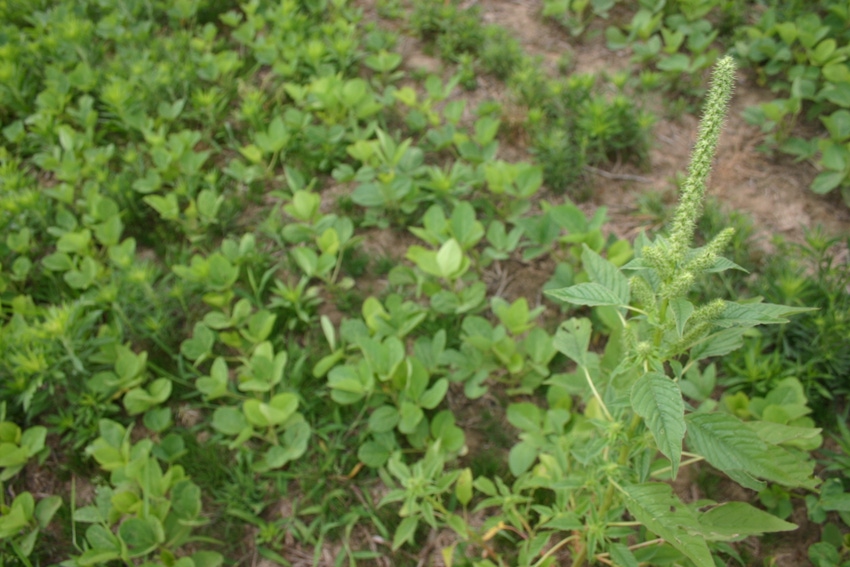
Mid-South weed specialists have been warning that pigweeds – already often resistant to multiple chemistries – were in danger of developing resistance to PPO chemistry.
Those warnings have proven prophetic. On Wednesday (July 22) afternoon, PPO-resistant pigweed was confirmed in Arkansas. Five days earlier, Larry Steckel, University of Tennessee weed specialist, said that several samples from the state were confirmed PPO-resistant following testing at the University of Illinois.
Speaking from the road on Wednesday, Bob Scott, University of Arkansas Extension weed specialist, explained where things stand. “It was just one of a few locations that are suspect, but the field that really had me worried was in southern Woodruff County. The producer had been relying pretty heavily on Valor, Flexstar and Blazer – all PPO chemistry. That field got my attention because it made it through a Valor pre-emerge, Flexstar post followed by Blazer post. Then, I came in and sprayed it again with Flexstar. All that and we still didn’t kill the pigweeds. I’m very suspicious of the pigweeds in that field.”
Suspect PPO-resistant pigweed fields showing up everywhere
Immediately after uttering that last sentence, Scott received a text from a university colleague. “Sure enough, it was just confirmed that we’ve got PPO-resistance in Arkansas. That’s bad news.”
Steckel said upon receiving news of his samples’ resistance, “it was like a kick to the stomach. It was a question of ‘when’ not ‘if’ – there’s been just way too much selection pressure -- but it still hurt. PPO products have been the bedrock of our weed control programs for years. To lose them, especially post, is a big blow.
“I’ve been checking suspect fields for the last three years, places where Flexstar or Blazer didn’t work. The farmers had done everything required so the products should have worked.
“So I sent four or five samples every year to the University of Illinois. They have a molecular test there – basically a ‘yes’ or ‘no’ – on whether or not the sample has the gene for PPO resistance. That was developed after they found PPO-resistant waterhemp in the Midwest over a decade ago.
“PPO resistance hasn’t been documented in any weed species other than waterhemp. That molecular test – developed with soybean check-off dollars, by the way -- is a much easier route to prove resistance than how we do it: collect seed in the fall, take it to the greenhouse, grow them out, spray them, etc.”
Luck runs out
In 2013 and 2014, all nine samples Steckel sent for molecular testing were negative for PPO resistance. Unfortunately, “this year I sent two samples up from two different fields from two different counties and growers. Both were hits for PPO resistance.”
Related Steckel blog post 1, post 2
Fields with suspicious pigweeds are “kind of centralized,” said Steckel. “They’re largely showing up in counties adjacent to the Mississippi River and Arkansas.
“It’s almost like a re-do of how glyphosate resistance played out initially. The scary thing, of course, is when glyphosate resistance happened, folks just put Flexstar in the tank. Well, Flexstar is gone and there’s nothing left to put in the tank.”
Steckel said there is a bit of potentially positive news if the experience of Midwest farmers and resistant waterhemp is precedent. “On waterhemp, the PPOs pre-emerge can still be effective. That may be true, as well, for pigweeds that are just emerging – maybe an inch tall.”
What might this mean for LibertyLink technology in the Mid-South?
“I tell you what, if Roundup Xtend and the Enlist technology don’t get global approval, I don’t see how a grower has much choice,” said Scott. “If they’ve got PPO resistance, LibertyLink is the only thing that’s made conventional and Roundup Ready beans possible.”
Clearly, said Steckel, there will be more LibertyLink soybeans in Tennessee. “I’ve spent time on the phone with retailers over the last couple of days. This is when they order product and they want to ensure they have what the farmers are looking to buy.”
Scott sees only one non-PPO chemistry control program for pigweeds. “The only program you could really use is Dual and Metribuzin followed by Liberty. That’s the only viable program approach for pigweeds that doesn’t include everything we’ve got resistance to: glyphosate, ALS and PPOs.
“The sad fact is the options for pigweed control have become extremely limited in soybeans. Now we’ve lost PPOs? That’s a big deal.”
“I’m not surprised it happened. How rapidly resistance happens is the only surprise. You go from no calls to a bunch of crisis calls about herbicide failures.
“Maybe I shouldn’t be surprised even about that. Think back on how glyphosate resistance developed. It seemed we went from no problem to problems everywhere. That blow-up seemed to happen in just one year.”
Tom Barber, another Arkansas weed scientist, has also brought in suspected PPO-resistant pigweeds for testing. “We’re all seeing these incidents,” said Scott. “We’ve all been getting calls about failures. Understand, though, there’s close to 3.5 million acres of soybeans in the state. So, those calls are just about a small fraction of those acres. But producers need to know because this is how the glyphosate-resistant pigweeds started. Pigweeds are so prolific, if they run a combine through some that are resistant, this could be a major issue on their land and their neighbors’.”
About the Author(s)
You May Also Like




